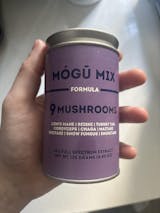I had 1/4 of my stomach removed because I had two tumors. In my research I found that mushrooms would help with the deescalation of the growth of tumors. I also learned of the other benefits of the mushroom. This is why I am taking the product for the formulation and purity of these 9 mushrooms
I’ve been taking Mogu mix for about 2 and a half years ever since I discovered them at a farmers market. I can’t live without it now, and it has improved my mental and physical immensely. I don’t do caffiene, so this is what gets me through the day. Love you guys. Thanks for everything.
I have been using Mogu mushrooms extract for a few years now… I absolutely love it…I add a small amount every morning to my coffee or tea… I feel amazing and believe it helps with my longevity and aging beautifully. I absolutely love Mogu mushroom extract ….every single one of them is great for heart health longevity alertness …..truly I don’t think I could live without my daily morning dose. Keep up the good work. I’ll be placing another order soon.




